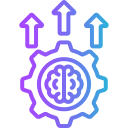Transformative Impact of AI on Medical Research
Artificial Intelligence is ushering in a paradigm shift in the landscape of medical research. Its unprecedented capacity to process vast and complex datasets, identify patterns, and drive automation is catalyzing breakthroughs in diagnostics, drug discovery, and personalized medicine. By augmenting traditional scientific methods, AI empowers researchers to tackle challenges that were previously insurmountable, accelerates the pace of discovery, and provides novel insights into the intricate mechanisms of human health and disease. This revolution marks not only a technological advancement but also a fundamental transformation in how scientists approach, understand, and ultimately shape the future of medicine.
AI-Driven Molecular Modeling
In the search for new therapeutics, AI-powered algorithms simulate molecular interactions at a scale and speed far beyond the reach of manual experimentation. These models predict how molecules will respond to various biological targets, helping researchers to rapidly screen vast chemical libraries for those compounds most likely to be effective. This approach shrinks the gap between hypothesis and validated candidate, ultimately translating into faster progress from the laboratory to clinical trials.
Predictive Toxicology and Safety Profiling
Before a new drug reaches testing in humans, rigorous assessments of its toxicity and safety profile are essential. AI systems now analyze historical data and biomedical literature to predict potential adverse effects of candidate compounds. By anticipating toxicity risks early in the process, researchers can prioritize safer compounds, reduce costly late-stage failures, and streamline the path to regulatory approval. This proactive stance not only protects patient safety but also conserves valuable resources within the pharmaceutical industry.
Personalizing Therapies with Genomic Insights
The marriage of AI and genomics has opened new horizons in the customization of drug therapies. Algorithms analyze genetic profiles to predict how individual patients will respond to specific treatments, paving the way for a more precise approach to medicine. This tailored strategy increases the likelihood of treatment efficacy while minimizing side effects, representing a transformative step toward truly personalized healthcare and improved outcomes for patients with diverse genetic backgrounds.
Previous slide
Next slide

Revolutionizing Clinical Trials and Research Efficiency
AI-Optimized Patient Recruitment
One of the major bottlenecks in clinical research has been the recruitment of eligible participants. AI-driven platforms now sift through electronic health records and demographic data to match patients to appropriate trials with unprecedented efficiency. By considering genetic, clinical, and geographic criteria, these systems increase enrollment rates and enhance the diversity of trial populations, which in turn improves the generalizability and reliability of study outcomes.
Automated Data Collection and Analysis
AI technologies automate the extraction and standardization of complex, multi-modal data from clinical trial environments. This capability reduces human error, ensures consistent data quality, and accelerates the generation of actionable insights. Furthermore, machine learning algorithms analyze interim data to identify trends or potential issues in real time, enabling adaptive trial designs and dynamic decision-making that enhance both safety and efficacy evaluations.
Reducing Bias and Enhancing Transparency
Clinical research has traditionally struggled with various forms of bias, whether in patient selection, data interpretation, or reporting. AI tools can systematically detect and correct these biases by examining patterns across large, diverse cohorts. Transparent algorithms also document the rationale behind analytical decisions, contributing to reproducible and objective research processes. The result is a higher standard of scientific integrity and credible results that better inform medical practice.
